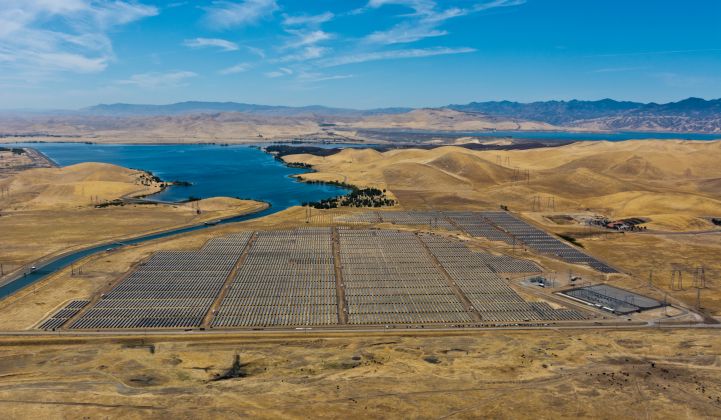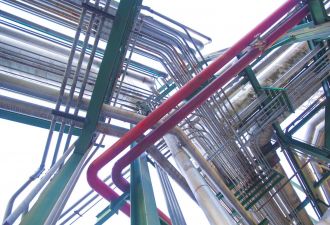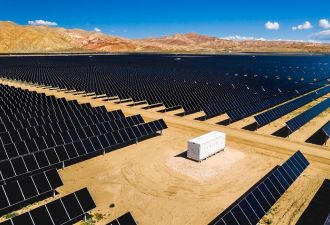[Editors note, March 28] This article contains an error regarding the number of shares eligible for distributions. The author is working on a corrected version which he expects will significantly reduce his valuation.
Solar YieldCo 8point3 Energy Partners' (CAFD) stock has been selling off, due in part to overblown reporting comparing it with troubled renewable energy developers SunEdison and SolarCity. SunEdison went bankrupt in an industry-shaking implosion last year, while struggling SolarCity was recently rescued through a takeover by Tesla (TSLA)
The analyst quoted in a recent Benzinga article, Gordon Johnson, has long been skeptical of solar names (as have I, for that matter). But in this case, Johnson's bearishness was blown out of proportion by the headline's emphasis on the scary SunEdison name. Some shareholders are spooked. A mutual fund manager who holds 8point3 in his fund told me that he was forwarded the article by an adviser with a panicked client. The fund manager asked not to be identified because of his firm's disclosure rules, but privately, he described the comparison of 8point3 and SunEdison as “crazy.”
SunEdison and 8point3 are fundamentally different types of companies. SunEdison was a developer. That is, most of its revenues and earnings came from building solar farms and other energy infrastructure, and selling them on. This can be a risky and unpredictable business, because unexpected project delays or changes in the market for finished projects can leave the developer with a lot of debt but no cash on hand to pay when it comes due.
The primary business of 8point3, or any YieldCo for that matter, is owning the solar farms after they are operational and are delivering power to buyers under long-term contracts. Their income stream is as steady and reliable as the power produced by a home solar installation: There will be some variation due to weather, and the inverter might need to be replaced after a decade or two, but overall the income is very reliable. Every day the sun comes up and produces power, and we even know approximately how much more power it will produce in the summer than the winter. For YieldCos, surprises are few and far between. For developers, surprises are part of the ordinary course of business.
Behind all the fuss, the real issue that has led to recent analyst downgrades is 8point3's plan to refinance company-level interest-only debt. The plan is to replace it with amortizing debt backed by the individual solar farms the YieldCo owns.The difference is that amortizing debt includes payments of both principal and interest, and so a switch to amortizing debt will have the effect of reducing cash available for distribution.
The problem with interest-only debt is that it needs to be refinanced before it comes due. SunEdison could not refinance its debt, hence the bankruptcy. Unlike SunEdison, 8point3's assets are solar farms which have long-term contracts, known as power-purchase agreements (PPAs), to sell electricity to creditworthy borrowers. The average remaining length of 8point3's PPAs is 20 years, and lenders are happy to make loans backed by this sort of low-risk asset.
In other words, there's no reason to believe 8point3 will have trouble refinancing its debt. The only question is how much the shift to amortizing debt will hurt cash flow available for distribution. As Gordon Johnson himself put it: “This is an optics problem, not a problem of solvency. 8point3 has a better credit profile than many of its peers. They should just go ahead and refinance some of their company-level debt and put their emphasis on the great assets they have in their [right of first offer] pipeline."
The numbers
A bankruptcy like SunEdison's is not in the cards for 8point3, but the question remains: Can 8point3 pay principal on amortizing debt while still making its promised distributions? Using numbers from 8point3's 2016 annual report and earnings call slides, we see that the YieldCo made $20.2 million worth of distributions to common shareholders, and $12.3 million to its sponsors, SunPower (SPWR) and First Solar (FSLR)
The YieldCo had a weighted average 21.4 million shares outstanding during 2016, with 28 million shares outstanding at the end of the year. The company's guidance is for distribution growth of 12 percent per share for 2017, or $1.06 per common share. Total distributions to common shareholders and sponsors would then be approximately $30 million to common shareholders, and $14 million to First Solar and SunPower, for $44 million total.
With the recent acquisition of two new solar farms in December, the YieldCo expects $91 million to $101 million in cash available for distribution in 2016. However, the 2017 guidance reconciliation (on slide 17 of the earnings presentation) shows only the payment of cash interest, with no payment of principal on loans, so we have to assume that this guidance does not assume any amortizing debt.
All of 8point3's debt matures in 2020, and it has $683 million outstanding. 8point3 would naturally use its projects with the highest-quality offtakers and longest contract terms to refinance its debt, which should allow it to refinance all of its debt with an average term of 20 years and an interest rate of 4.5 percent. Most of its current debt is at Libor plus 2 percent, or a little less than 4 percent interest-only, for an annual payment of $27 million. If it refinanced all of its debt at 4.5 percent, amortizing over 20 years, any mortgage calculator will tell you that the annual payment would increase by $25 million to $52 million.
Subtracting this from 8point3's 2017 cash available for distribution guidance, we are left with $66 million to $76 million, well in excess of the $44 million needed for a 12 percent increase in 2017 distributions.
Worst-case scenario
While 8point3 should have no problem paying $1.06 in distributions to common shareholders in 2017, all of its sponsors' subordinated shares will be eligible for distributions in the second half of 2018. Assuming little further growth, cash available for distribution, and a full refinancing of 8point3's current debt, 8point3 will only be able to maintain its current $1 per share annual distribution after that point.
I consider this the worst-case scenario: distributions limited to $1 per year for the next 20 years, with no value after that. At the current price of $13, that amounts to a 4.8 percent internal rate of return -- not too exciting, but nothing to cry about, either. In a more likely scenario, 8point3's stock price will recover at some point, and it will be able to issue new equity, purchase new projects and resume modest growth. If the share price does not recover, the YieldCo will likely be purchased for its assets at a modest premium within a few years. Either of these more likely scenarios should result in 10 percent to 15 percent annualized returns from the current share price.
Looking forward
8point3 Energy Partners needs to refinance its debt, and its high-quality assets mean that it will have no trouble doing so. This refinancing could limit the YieldCo's ability to increase its long-term dividend above $1 per share, unless the share price recovers. This worst-case scenario would lead to modest total returns of 4 percent to 5 percent over the next 20 years, but the more likely options of a share price recovery or a buy-out would lead to attractive annual gains in excess of 10 percent.
All in all, 8point3 is an attractive opportunity with little downside for patient investors.
***
Disclosure: Tom Konrad manages and has a stake in the Green Global Equity Income Portfolio (GGEIP), a private fund which invests in YieldCos and other high-income green stocks. GGEIP currently owns CAFD.



